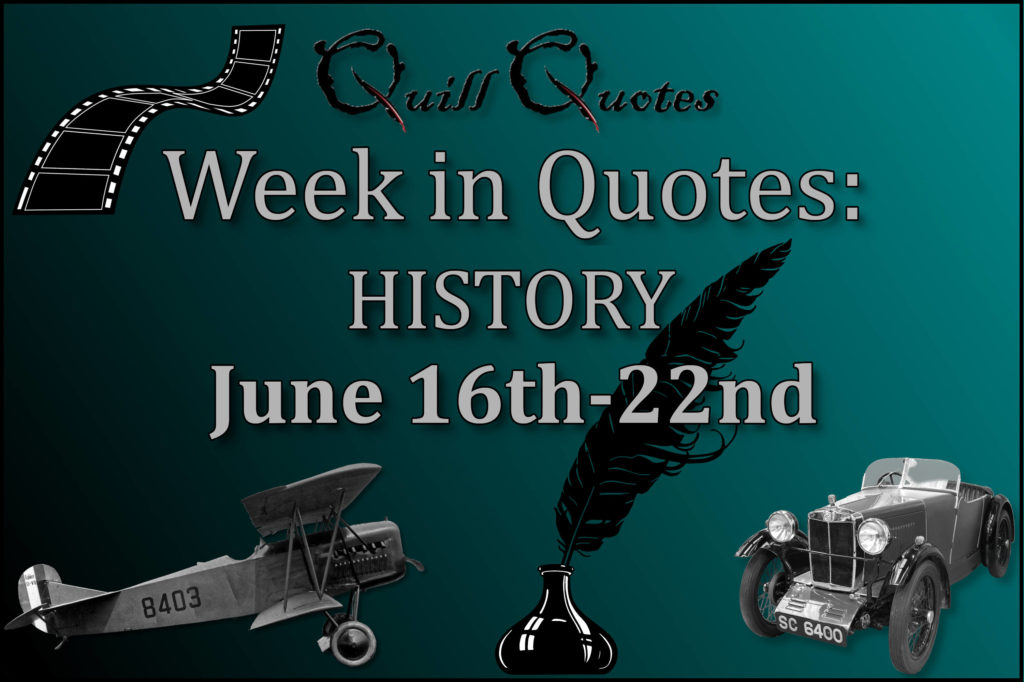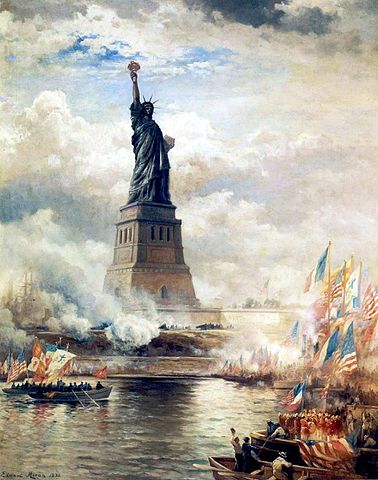There is always much to learn from quotes and their historical significance. Read on for a collection of quotes and general history from June 16th – 22nd.

June 16, 1858
“A house divided against itself, cannot stand. I believe this government cannot endure, permanently, half slave and half free. I do not expect the Union to be dissolved — I do not expect the house to fall — but I do expect it will cease to be divided. It will become all one thing or all the other. Either the opponents of slavery will arrest the further spread of it, and place it where the public mind shall rest in the belief that it is in the course of ultimate extinction; or its advocates will push it forward, till it shall become lawful in all the States, old as well as new — North as well as South.”
– Abraham Lincoln
Abraham Lincoln delivered his famous “House Divided” speech on June 16, 1858, after accepting the Republican Party’s nomination for Illinois US senator. His speech sought to discredit his opponent’s support for popular sovereignty, where the settlers in each new territory would decide their own status as a slave or free state. Lincoln ultimately lost the senate race to incumbent Democrat, Stephen A. Douglas. However, this speech and the Lincoln-Douglas debates that followed gave Lincoln a national following which helped lead to his presidential election in 1860.
June 17, 1885
“Give me your tired, your poor,
– Emma Lazarus, “The New Colossus”
Your huddled masses yearning to breathe free,
The wretched refuse of your teeming shore.
Send these, the homeless, tempest-tossed, to me:
I lift my lamp beside the golden door.”
On June 17, 1885, the Statue of Liberty arrived in New York Harbor from France. French sculptor Frédéric Auguste Bartholdi designed the statue after his own mother with help from engineer Gustave Eiffel. “Liberty Enlightening the World”, as Bartholdi named it, was intended to be completed in 1876 to commemorate the 100th anniversary of America’s Declaration of Independence. However, fundraising took far longer than expected and the statue was not officially dedicated until October 28, 1886.

June 18, 1940
“The whole fury and might of the enemy must very soon be turned on us. Hitler knows that he will have to break us in this Island or lose the war. If we can stand up to him, all Europe may be free and the life of the world may move forward into broad, sunlit uplands. But if we fail, then the whole world, including the United States, including all that we have known and cared for, will sink into the abyss of a new Dark Age made more sinister, and perhaps more protracted, by the lights of perverted science. Let us therefore brace ourselves to our duties, and so bear ourselves that, if the British Empire and its Commonwealth last for a thousand years, men will still say, “This was their finest hour.”
– Winston Churchill
On June 18, 1940, Winston Churchill gave one of his most famous speeches to the British House of Commons. France had just fallen to Nazi Germany and Britain expected to be invaded next. Churchill’s “This was their finest hour” speech sought to maintain resolve for the war by outlining the advantages the British still held against Germany and the terrible consequences the world faced should they fail.
June 19, 1910
“Anyone can be a father, but it takes someone special to be a dad, and that’s why I call you dad, because you are so special to me. You taught me the game and you taught me how to play it right.”
– Wade Boggs
Father’s Day was celebrated for the first time on June 19, 1910, in Spokane, Washington. Sonora Smart Dodd, one of six children raised by her single father, rallied support for the holiday believing fatherhood deserved a similar recognition to Mother’s Day. Due to the lower commercial sales appeal, Father’s Day spread slower than Mother’s Day. However, during the Great Depression, struggling retailers increased their advertising efforts to make Father’s Day a commercial success. In 1972, Father’s Day was finally made a national holiday by President Richard Nixon, after being celebrated for many years.
June 20, 1967
“Impossible is just a big word thrown around by small men who find it easier to live in the world they’ve been given than to explore the power they have to change it. Impossible is not a fact. It’s an opinion. Impossible is not a declaration. It’s a dare. Impossible is potential. Impossible is temporary. Impossible is nothing.”
– Muhammad Ali
On June 20, 1967, Muhammad Ali was found guilty and sentenced to five years in prison for refusing to be drafted in the Vietnam War. Muhammad Ali, formerly Cassius Clay, had joined the Nation of Islam in 1964 and cited his religious beliefs as grounds for refusal. He was also opposed to the Vietnam War and is famously quoted saying, “I ain’t got no quarrel with them Viet Cong.” Ali appealed the conviction and it was eventually overturned by the Supreme Court in 1971. Although he remained free during the appeals process, he lost several prime years of his boxing career.
June 21, 1788
“We the People of the United States, in Order to form a more perfect Union, establish Justice, insure domestic Tranquility, provide for the common defence, promote the general Welfare, and secure the Blessings of Liberty to ourselves and our Posterity, do ordain and establish this Constitution for the United States of America.”
On June 21, 1788, the United States Constitution was ratified. Requiring a two-thirds majority, New Hampshire was the 9th of the 13 states to ratify and reach this threshold. Following ratification, the new federal government organized and began operations on March 4, 1789.
June 22, 1633
“The Bible shows the way to go to heaven, not the way the heavens go.”
– Galileo Galilei
Galileo Galilei was found “vehemently suspect of heresy” by the Catholic Church on June 22, 1633. He was forced to recant his opinions on heliocentrism, that the Earth orbits the Sun, and sentenced to house arrest for the remainder of his life. In rebellion, Galileo is famously quoted as saying “And yet it moves” in reference to the Earth around the Sun. Galileo died January 8, 1642, and it wasn’t until October 31, 1992, that the Vatican admitted their error in sentencing him.
In case you missed last week’s quotes, see History June 9th – 15th.
To never miss a Quill Quotes post, please subscribe to our free Email Newsletter and follow us on Social Media.
Sometime we forget the words and facts behind THE STATUE OF LIBERTY. She sat in the harbor just waiting for the ships to come in carrying the tired, the poor and the hungary persons set on building a new life for themselves. I can’t get enough of HER and what she stands for. Lady Liberty for sure.
Yeah, we could all use a little reminder about what she stands for.